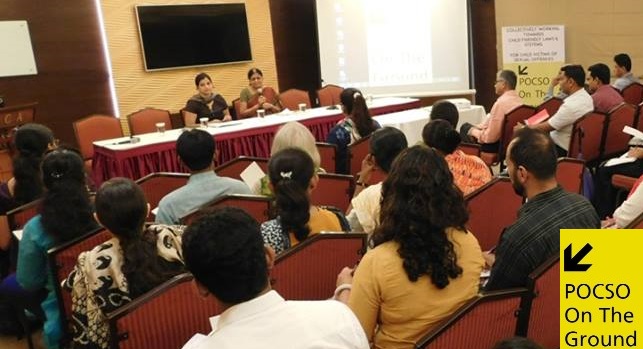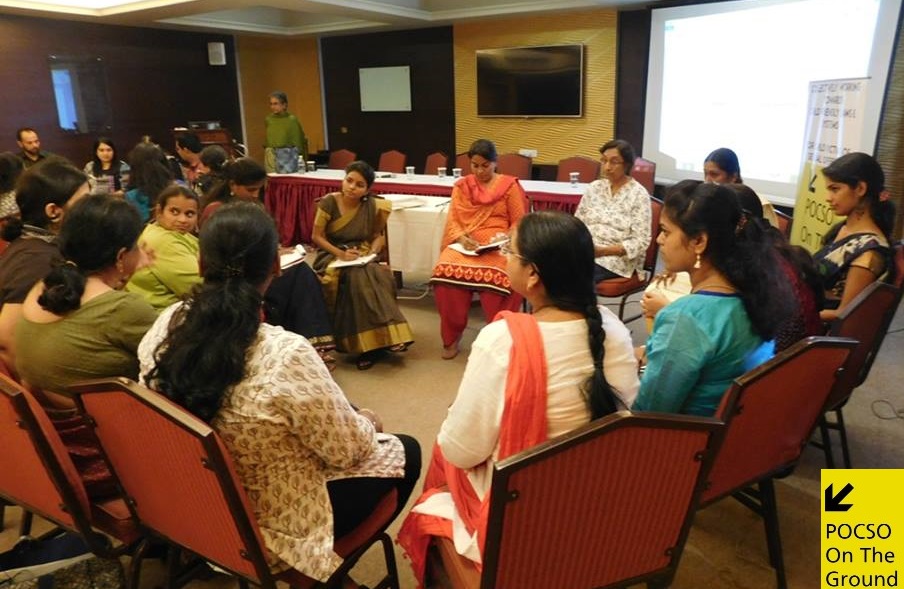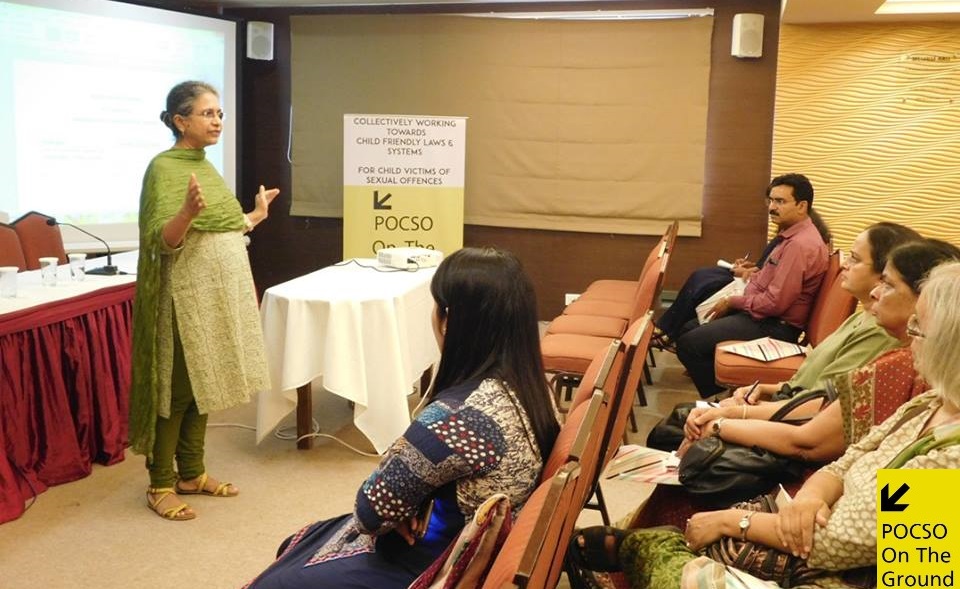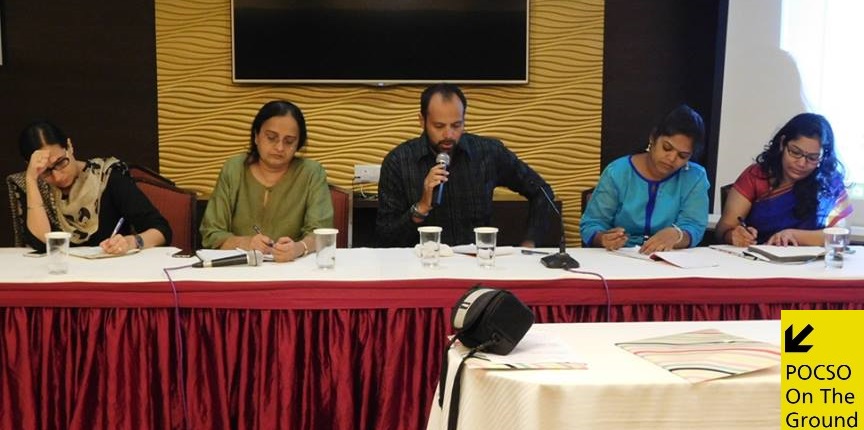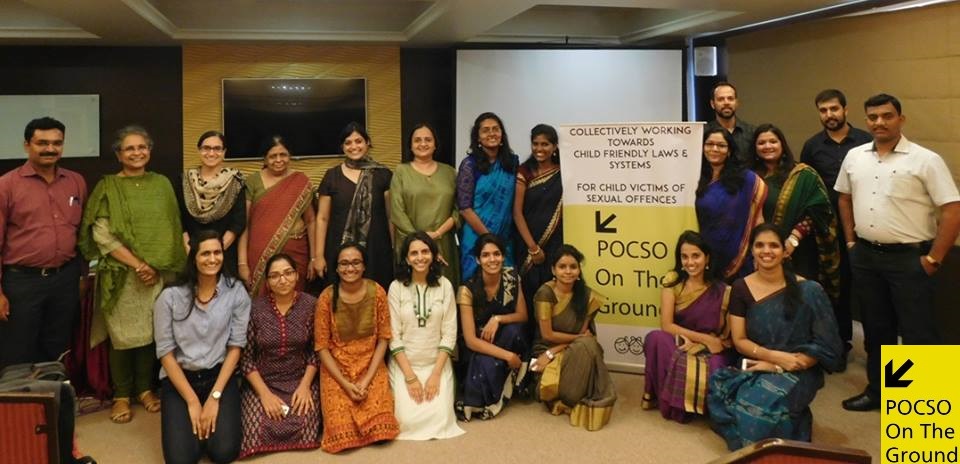POCSO On the Ground IV: The Manodhairya Victim Compensation Scheme
 The 4th edition of Pocso On The Ground (POTG), organized by Prerana in collaboration with UNICEF on 16th June 2017, sought to shed light and bring to the forefront experiences, challenges and success of the Maharashtra State Government’s Manodhairya Victim Compensation Scheme. Passed on 2nd October 2013, the scheme ensures financial assistance and support services for victims of sexual violence and acid attacks. Child victims of sexual offences in cases registered under POCSO sections 3, 4, 5 & 6 (Penetrative Sexual Assault& Aggravated Penetrative Sexual Assault) are eligible for compensation under the scheme.
The 4th edition of Pocso On The Ground (POTG), organized by Prerana in collaboration with UNICEF on 16th June 2017, sought to shed light and bring to the forefront experiences, challenges and success of the Maharashtra State Government’s Manodhairya Victim Compensation Scheme. Passed on 2nd October 2013, the scheme ensures financial assistance and support services for victims of sexual violence and acid attacks. Child victims of sexual offences in cases registered under POCSO sections 3, 4, 5 & 6 (Penetrative Sexual Assault& Aggravated Penetrative Sexual Assault) are eligible for compensation under the scheme.
Over 70 participants from 24 organizations across Mumbai and Maharashtra contributed their front-line expertise to the discussion. The Rehabilitation Tool Kit worked by the Rehabilitation group was shared with the participants at the conference.
The commencement of POTG Edition 4 was announced by Ms. Priti Patkar, Founder, Prerana with a brief recap of the evolution of the POCSO law and shared the objective behind the POTG.
Session 1:
‘Overview of the Manodhairya Compensation Scheme’ by Ms. Audrey D’Mello, Director, Majlis
‘Ground experiences of Department of Women and Child Development on Manodhairya Victim Compensation’ by Ms. Sapna Yende, Probation Officer of Manodhairya Scheme from Department of Women and Child Development- Mumbai Suburban.
Moderator: Ms. Kamini Kapadia, State Consultant, Child Policy and Advocacy with UNICEF
- CLICK HERE FOR SALIENT FEATURES OF THE MANODHAIRYA VICTIME COMPENSATION SCHEME
- The scheme calls for swift action after a case of rape or acid attack is registered at the police station.
- A District Injuries Relief and Rehabilitation Board headed by the district collector and comprising a police official, district medical officer (JJ Hospital medical officer in case of Mumbai), public prosecutor, representatives from a social organization and WCD department, will meet within seven days of the FIR being registered (FIR).
- The amount will be disbursed within 15 days from the date of the FIR. Victims are entitled to receive monetary relief between Rs 2-3 lakh. Acid attacks victims, who are maimed for life, will get Rs 3 lakh and Rs 50,000 will be immediately paid to those victims who sustain bodily injuries.
- While 75% of the total compensation will be deposited in the bank account of the rape victims for three years, the rest 25% will be handed over to them within the prescribed period. For victims below 18 years of age, 75% of the compensation amount will be deposited in their “minor accounts” for three years as “fixed deposit”. They will only be entitled to avail 25% of the compensation. The rest 75% will be made available to the victims when they turn major or after three years, whichever is earlier.
- Also, to victims who have been raped on the pretext of marriage and false promises, the committee will provide a relief of Rs 2 lakh, half of which will be paid at the time of registration of FIR and the rest after the chargesheet against the accused is filed in the court.
- Keeping in mind victims who cannot afford a lawyer, the state has provided legal help by appointing a public prosecutor.
- The scheme also asks setting up of “district trauma teams” to provide assistance to the victim’s family as soon the incident takes place. The team has a woman representative Department of Women and Child Development (DWCD), medical officer, support person and a police official.
Key observations covered during the presentation:
• As per the DWCD Mumbai Suburban records, the reporting of the sexual offence cases has increased after the implementation of Manodhairya scheme. It was mentioned that there are times where 70 cases get registered under the scheme in the space of an hour.
• It is the responsibility of the Investigation Officer to apply for the Manodhairya Compensation Scheme.
• The case is first discussed by the District Relief and Rehabilitation Board. Then, once the amount has been decided and approved, the board sends a Manodhairya sanction letter addressed to the victim.
• The FIR, bank account details (of a nationalized bank), residential proof like aadhaar card, rent agreement, electricity bill have to be submitted to the Manodhairya Probation officer at DWCD office. Following which, a letter is sent by the DWCD to the branch manager of the victim’s bank along with details of the disbursement bifurcation (which specifies conditions for utilization of the amount).
• There is a provision for emergency disbursement for medical purposes under the schemes. In some cases, an emergency amount of Rs. 50, 000 has been disbursed by DWCD Mumbai.
• The DWCD is currently working on an online database of Manodhairya victims and all the NGOs present were requested to share the data available at hand about cases of POCSO with the DWCD so that they can have a better quality data to function upon.
• The DWCD clarified that it has enough funds in hand to disperse under the scheme. Therefore civil society organizations were requested to approach them eligible cases.
• The DWCD mentioned that organizations facing challenges in working with the scheme can approach them for clarifications and support.
• District Trauma Teams (DTT) have been set up across the state of Maharashtra under the Manodhairya scheme. In Mumbai, all the POs, DCPOs, SP, DCP, nurses, ANM were part of the DTT training and a list of all the members of DTT had been circulated to all the police stations of 52 districts of Maharashtra. They have been trained to provide immediate & specialized assistance to the victim including help with recording of statement, proper investigation, and medical check-up of victim and collection of evidence.
Questions, Suggestions & Challenges discussed by the Group
• The biggest concern expressed at the outset was that the State Government is planning to discontinue the scheme because according to the state departments, the implementation of the scheme is not taking place as envisaged.
• Also, there seems to be a notion that a lot of false cases are being reported to avail of the monetary compensation.
• The need for civil society groups to collectively advocate for the continuation of the scheme was expressed.
• Judgmental attitudes towards the victims even within the systems sometimes cause delay in disbursement of the money. These biases sometimes also result in the compensation being rejected. There is an urgent need for sensitization in the system.
• While the scheme clearly mentions that FIR is the only document to be considered before sanctioning the compensation; this is not followed in practice. Instead, the committee asks for medical reports before it decides to sanction the compensation.
• Considering that the Manodhairya came into effect in 2013, only cases registered after the date are being considered as eligible for compensation. However, it was mentioned that there is an ongoing litigation seeking compensation under Manodhairya in a case that was registered before October 2013.
• Manodhairya has two broad aspects: monetary and rehabilitation. It is the monetary aspect that is focused on and less attention is given to the rehabilitation aspects of the scheme.
• There is a general lack of information on the existence and functioning of the District Trauma Team.
• Other Major challenges faced by the DWCD during disbursement of the compensation are listed as follows:
-Delay in submission of FIR by the police,
– Address of the victim given is incorrect or vague
– Migration of victim and family post the incident
– No bank details of the victim available
– Non-cooperation of various branches of banks,
– Insufficient Know Your Customer (KYC) documents with the victim
– Undecipherable medical reports
– Non-availability of guardianship certificate.
Session 2:
Voices from the Civil Society Organizations and CWCs share their experiences with the Manodhairya Scheme
Speakers:
1) Mr. Shyam Gorad, Chairperson, CWC Mumbai Suburban
2) Ms. Jayalaxmi, Superintendent of Ashasadan Girl’s Shelter Home. (Mumbai)
3) Ms. Sujata Ayerkar, CEHAT
4) Dr. Pravin Khandaposale, Founder of Disha (Amravati, Maharashtra)
5) Ms. Meenal Thakore, Chairperson, CWC Thane.
6) Ms. Madhuri Shinde, Superintendent of Naunihal BalikaAshryagruh (Kharghar)
7) Reshma Naykodi, Project Co-ordinator at Aarambh India Initiative
Moderator: Ms. Priti Patkar
Ms.Priti Patkar introduced the speakers, all of whom have worked closely with the Manodhairya victim compensation scheme. She shared that the aim of this discussion was to hear the voices from rural and urban Maharashtra about the ‘On-Ground Experiences ofManodhairya’.
Reshma Naykodi, Project Co-ordinator at Aarambh India Initiative:
Ms. Naykodi presented the status of Manodhairya applications of the POCSO cases registered at CWC Mumbai City and Suburban and elaborated on the role of the social workers in these cases.
- It was observed that in most of the cases registered at CWC Mumbai, the Manodhairya Compensation was sanctioned within a year.
- However in case of rejection, the grounds on which the application was rejected is not informed to the families.
- There have been experiences in several cases where the concerned investigation officers did not have any knowledge about Manodhairya scheme and therefore, had not applied for compensation.
Lack of proper identity proof documents of the victims for opening a bank account causes delay in the procedures at DWCD. - There is a need for uniformity in procedures among the 2 DWCDs in Mumbai. For eg: Currently, one DWCD insists on opening a bank account in a particular bank while the other says that any nationalized bank will do.
- The Probation Officers of DWCD Mumbai were observed to be supportive and have guided the families and social workers during the procedures. This supportive handholding has enabled many families access the compensation
Mr. Shyam Gorad, Chairperson, CWC Mumbai Suburban
Mr. Gorad shared the Child Welfare Committee, Mumbai’s experiences in cases where child victims under POCSO referred to them were eligible for Manodhairya:
- There is a need of sensitization among the police about the act. In some instances, while filing the FIR, the police do not add the relevant sections under POCSO.Such oversight may deny an eligible victim of their rightful compensation.
- There is a need to compare the status of Manodhaiya applications in POCSO cases registered at various police stations across the city. This would help give an overview of the situation which can later help in designing and deploying sensitization & advocacy programs around it.
Ms. Jayalaxmi, Superintendent of Asha Sadan Girl’s Shelter Home (Mumbai):
Ms. Jayalaxmi shared her experience of securing Manodhairya compensation for child victims staying at AshaSadan. She shared challenges faced by shelter homes during the Manodhairya procedures:
- Out of 106 POCSO cases eligible for Manodhairya admitted in AshaSadan, only 3 victims have received compensation.
- There has been a delay in sanctioning of the Manodhairya compensation. In few cases, the victims have not received compensation even after conviction of the accused.
- There is a lack of awareness about the scheme among the victims and their families.
- The Shelter homes face challenges while opening bank accounts especially for victims of orphans as they have no ID proof or other related documents.
- It was suggested that when the police report a case of POCSO registered under sections eligible for Manodhairya Scheme to the CWC, the CWC can request police to confirm whether or not the application for the Manodhairya compensation has been sent to the DWCD.
Ms. Sujata Ayekar from CEHAT (Mumbai):
Ms. Ayerkar presented the statistics of POCSO cases in which CEHAT had intervened. The statistics were in terms of age group of victim and relationship with the abuser. She further shared her organization’s on-ground experience of the procedures of Manodhairya:
- There is a lack of awareness among police about the Manodhairya scheme and its procedures.
- Unavailability of proper identity proofs of the victim for opening the bank account was causing delay in the Manodhairya procedures.
- Once the application is sent by the police to the DWCD, there is need for a mechanism to find out status of the application.
Dr. Pravin Khandaposale, Founder, DISHA (Amravati, Maharashtra):
Dr. Khandaposale shared DISHA’s experiences with their helpline which functions in Amravati for victims of sexual violence. This helpline addresses issues related to the procedures of POCSO as well as Manodhairya victim compensation. The DISHA team also follows up on these cases to make sure that the victims have received the information that was needed. He further shared statistics of the Manodhairya compensation of Amravati district.
- There were concerns raised about the judgmental attitude of the authorities if the child victim is above the age of 16 years of age where the incident is viewed by the authorities as “consensual” despite the statement of the child.
- It was observed that while focus is given on financial assistance of the victim; there is a need to concentrate on the comprehensive rehabilitation of the victim.
- There is a need for systematic functioning of the District Trauma Teams in the districts
- Once the victim receives the compensation, the DWCD must follow up to understand how the compensation amount was being utilized for the child victim’s rehabilitation.
- There is a need to involve the media in raising awareness about the scheme.
Ms. Meenal Thakore, Chairperson, CWC Thane:
Ms. Thakore shared the Child Welfare Committee, Thane’s experiences in cases where child victims under POCSO referred to them were eligible for Manodhairya:
- There is lack of awareness among the police about the law and Manodhairya Victim Compensation Scheme.
- There have been cases where the police have addressed cases of incest as ‘family matter’. Such arbitrary labeling results in victims being denied access to the compensation and rehabilitation.
- There is a lack of recognition of the CWC’s work and power among the police.
Ms. Madhuri Shinde Superintendent of Naunihal Balika Ashryagruh (Kharghar):
Ms. Shinde presented the Manodhairya compensation status of the POCSO cases in Prerana’s Naunihal Shelter Home and shared the on-ground experience while working with DWCD Raigad for Manodhairya:
- The functioning and response of the DWCD Raigad with regards to the Manodhairya compensation scheme was described as ‘smooth’. Victims receive Manodhairya compensation within 6 to 7months of filing of the FIR.
- A detailed study of the functioning of the stakeholders, especially the district collector of Raigad needs to be conducted to understand the procedures followed by them. This can be highlighted as ‘best practices’.
- Incase the child victim is eligible for two different schemes of the government one of which is Manodhairya, then the Manodhairya scheme is considered, as the compensation amount sanctioned under this scheme is higher.
- There is suspicion raised by the relatives of the child victim on the shelter home, as they feel that the Shelter home will usurp the compensation money.
- Towards the end of the discussion, the group concluded that there was a need for strengthening and sensitization of the systems so that they could continue functioning smoothly once the civil society organizations withdraw their support.
Session 3:
Clarification to the issues raised by the group on Manodhairya Compensation.
There was a group discussion on the problems faced on ground while implementing the Manodhairya scheme and the possible solutions for the same. Three groups were created and after the discussion within the group, one member from each presented the problems and solutions.
Adv. Persis Sidhva from Majlis and Ms. Alpa Vora from UNICEF Maharashtra moderated the group presentations and shared their experience and learning on the Manodhairya scheme. Following were the problems and solutions discussed by the group:
Challenges & Possible Action Points
- There is lack of awareness about the scheme in Police and the citizens
- Functioning of Mahila Dakshata Samiti is not uniform across the state of Maharashtra
- The service providers and families are unaware about the procedure of utilization of the Manodhairya compensation. Need for awareness within the police to focus on POCSO sections and the Manodhairya scheme
- Training of The Mahila Dakshata Samiti to spread awareness within the communities about the Manodhairya victim compensation.
- Need for a written order describing in detail the procedure of utilization of the compensation money.
Re: The Police:
- Delay in submitting of the FIR to the DWCD (incase of victim eligible for Manodhairya compensation)
Incomplete details in FIR and other related documents resulting in the delay in the procedures for sanctioning the compensation. - Due to missing POCSO sections, Manodhairya is not availed by some victims despite being eligible. – CWC could follow up with the Police officers to check the status of the Manodhairya application
Checklist of documents needed for Manodhairya application to be given to each police station
Re: DWCD
- Activating & Strengthening of the DTT
- Need for regular District Injuries Relief and Rehabilitation Board meetings so that the Manodhairya compensation is sanctioned within short duration/
- A lot of cases are kept on hold because of lack and absence of paperwork.
- The compensation status of the case is unknown in majority of the cases
- Lack of uniformity in the procedures of Manodhairya in Mumbai district
- Badges for DTT for their identification
- Principal Secretary, Collector and Commissioner of WCD should meet once a month to discuss the scheme and its implementation
- Document the best practices by including the case studies, across Mumbai, Thane and Raigad in an attempt to standardize the DWCD procedures for Manodhairya across the state.
- The status of the cases should be made online – one should be able to track the cases using Cr No.
- Systematic campaign to ensure Manodhairya stays in place and collective efforts should be put to strengthen the implementation of the scheme.
- UNICEF proposed that they could analyze the data available based on demographics with the DWCD
- Use #HelpMeWCD in tough cases on social media and reach out to Ms. Maneka Gandhi, Minister, MWCD
Bank Procedures:
- Difficulty in opening of bank accounts of the victims due to lack of Identity proofs and related documents.
- Dissemination of the circulars and SOPs (simplified versions) across the stakeholders by the DWCD
Other Suggestions:
- A presentation on the REVIEW OF MANODHAIRYA to be presented in the respective departments to integrate the protection and probation officers.
- Ms. Sapna, Probation Officer of DWCD Mumbai Suburban informed about the launch of the Savitribai Phule software where details regarding POCSO cases can be uploaded.
Way Forward:
Manodhairya Victim Compensation is an immediate relief for the victim and their family after the incident has happened. The 4th edition of POTG provided a space for understanding the existing scenario from the experiences that were shared from the ground. The presence of voices and perspectives from outside Mumbai added a new and important dimension to the existing issue.
The On-Ground experience, learnings and suggestions of the Manodhairya victim compensation will be documented and shared with the higher authorities at Maharashtra State Level and the DWCD, to give a ground level insight to the department.
POCSO On The Ground (POTG) is a series of consultations organized by Prerana in partnership with UNICEF in which individuals and organizations working on child rights engage in evidence-based discussions. These discussions center around the successes and challenges encountered while working on various aspects of engaging with child victims of sexual offences under the Protection of Children From Sexual Offences (POCSO) Act 2012.


